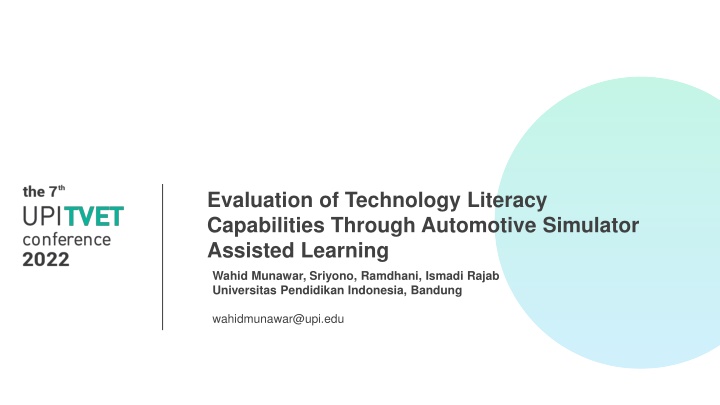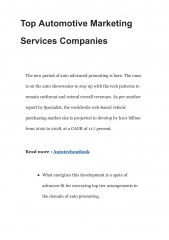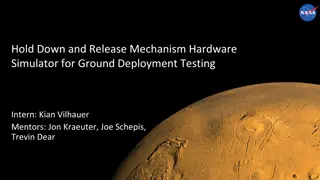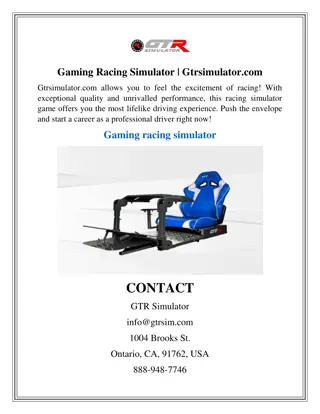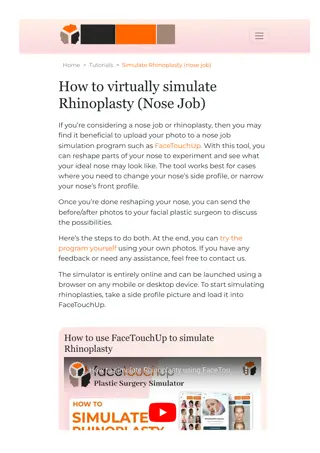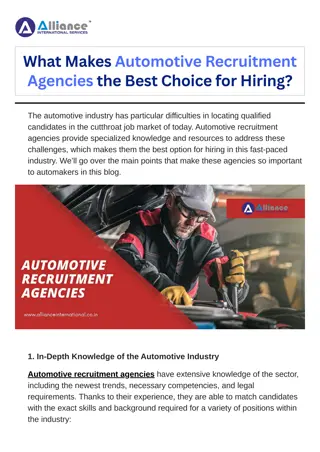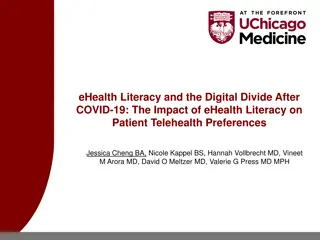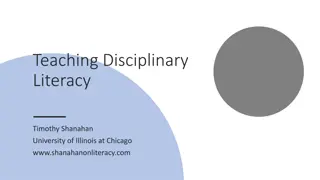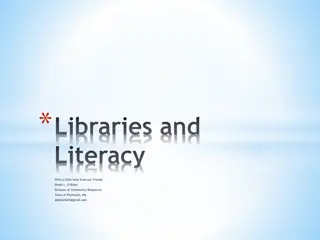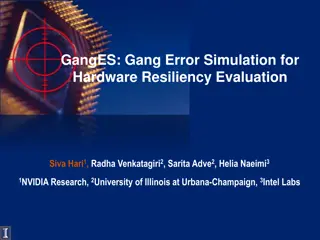Evaluation of Automotive Technology Literacy Capabilities Through Simulator-Assisted Learning
Automotive technology learning innovation in vocational high schools focuses on enhancing students' knowledge and competence using simulators. This research delves into the effectiveness of automotive simulators in improving technology literacy among students.
Download Presentation

Please find below an Image/Link to download the presentation.
The content on the website is provided AS IS for your information and personal use only. It may not be sold, licensed, or shared on other websites without obtaining consent from the author.If you encounter any issues during the download, it is possible that the publisher has removed the file from their server.
You are allowed to download the files provided on this website for personal or commercial use, subject to the condition that they are used lawfully. All files are the property of their respective owners.
The content on the website is provided AS IS for your information and personal use only. It may not be sold, licensed, or shared on other websites without obtaining consent from the author.
E N D
Presentation Transcript
Evaluation of Technology Literacy Capabilities Through Automotive Simulator Assisted Learning Wahid Munawar, Sriyono, Ramdhani, Ismadi Rajab Universitas Pendidikan Indonesia, Bandung wahidmunawar@upi.edu
Introduction Automotive technology learning innovation in vocational high schools is interpreted as a renewal of the learning process, from the teacher teaching the automotive subject using lectures and practicums with minimalist facilities, then innovation is carried out by the teacher learning using an automotive simulator. Automotive learning has learning characteristics that emphasize hard skills and soft skills. In automotive knowledge, students are expected to be able to apply knowledge, tools and materials for automotive work practices when doing automotive practice. In automotive practice, students are expected to have skills in work processes and produce work products that have quality and time standards. The question in this study is whether automotive simulators can improve automotive technology literacy in vocational high school students? 2
Methods This research is using descriptive method. The research location is in a state vocational high school with an automotive study program. The research sample using cluster random sampling was selected one class of 35 students. The research instrument is a technology literacy test in the form of multiple choice on aspects of basic automotive knowledge. Technological literacy indicators consist of: (1) Identifying scientific problems; (2) Explaining scientific phenomena; and (3) Using scientific evidence. The scope of the test questions includes air conditioning material in vehicles. The test questions have been validated by five teachers and automotive expert lecturers. To determine the validity and reliability used anates V4. The treatment of automotive learning is virtual and face-to-face, using simulator media. Data analysis uses basic statistics by calculating the percentage of automotive technology literacy achievement in the aspects of knowledge and competence. 3
Results the average automotive technology literacy ability in the aspects of knowledge and competence is 46.6% with the achievement category "good". The data also provides information that the questions that are able to be answered by students with the "good" achievement category are five questions, the questions answered in the "enough" category are six questions, and the questions that can be answered in the "less" category are three items. question. The research data related to automotive technology literacy skills in the aspect of knowledge and technological competence shows that two aspects of knowledge are included in the good category, namely: (1) the function of the air conditioning component in the car which was answered by 45.7% of students (2) the layout of the air conditioning component. 65.7% of students answered the air in the car, while one aspect of technology competence was included in the sufficient category, (3) the air conditioning cycle in the car, which was answered by 28.6% of the students. 4
Results the percentage of achievement of automotive technology literacy skills on scientific identification indicators (car air conditioning issues) is 71% with the "good" category the percentage of achievement on indicators using scientific evidence (car air conditioning technology data) is 46% with the "enough" category. the percentage of achievement of scientific literacy on the indicators explaining scientific phenomena (the phenomenon of car air conditioning technology) is 40% with the "enough" category. 5
Conclusion Automotive technology literacy skills of vocational high school students in the aspect of automotive technology knowledge competence are included in the good category the automotive technology literacy competence aspect it is enough. The literacy ability of automotive technology in the aspects of knowledge and competence is 46.6% with the achievement category "good". The literacy skills of automotive technology in the knowledge aspect are in good categories, namely: (1) the function of the air conditioning component in the car and (2) the layout of the air conditioning component in the car, while the automotive technology competence aspect is in the sufficient category, namely the air conditioning cycle in the car 6
